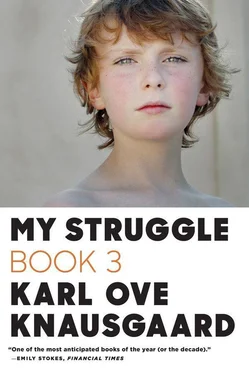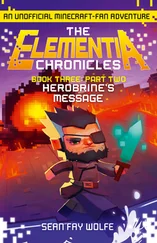I turned and walked slowly down the drive with my eyes glazed with tears. Why hadn’t they called at my house?
I stopped by the barrier between the two roads. Stood for a moment stock-still, listening. Not a sound. I sat down on one of the barriers. The rough concrete chafed against my thighs. Dandelions grew in the ditch below, all gray with dust. There was a grid next to it, rusty and with a sun-faded cigarette packet stuck between the bars.
Where could they have gone?
Down to Ubekilen?
Down to the pontoons?
To the soccer field and the play area?
Had Geir taken Leif Tore to one of our places?
Up the mountain?
I scanned the mountain. No sign of them there anyway. I got to my feet and started to make my way down. At the crossroads by the cherry tree there were three ways to choose among, if you were going to the landing stages. I chose the one to the right, through the gate, along the path covered with soil and twigs beneath the deep shadows from the tops of the enormous oaks, down to the field where we usually played soccer even though it sloped on both sides and the grass was knee-high, trampled from very early spring, there were also sapling trees growing on it, past the cliff with its grayish crags, generally bare but with some low scattered cover, and on through the forest to the road. Beyond it there was the new marina, blasted out of the rock, with three identical quays, all with wooden gangways and orange pontoons.
They weren’t there, either. I walked along one pontoon anyway; a double-ender had just moored at the tip, it belonged to Kanestrøm, and I went over to see what was happening. Kanestrøm was alone on board and peered up as I stood by the bow.
“So it’s you who’s out and about, is it?” he said. “I’ve been doing a bit of fishing, as you can see.”
The sun glinted on his glasses. He had a moustache, short hair, a little bald patch on top, and wore denim shorts, a checked shirt, and sandals.
“Would you like to see?”
He held up a red bucket in my direction. It was full of thin, slippery mackerel with bluish, glistening skin. Some were twitching, and the movement seemed to spread to the other bodies lying so close to one another it was as though it were one and the same creature.
“Wow!” I said. “Did you catch all of them?”
He nodded.
“All in the space of a few minutes. There was a huge shoal just offshore. Now we’ve got enough food for several days!”
He put the bucket down on the narrow gangway. Lifted an old gasoline canister, and put it down beside the bucket. Then some fishing lines and a can of hooks and lures. Humming an old song all the while.
“Do you know where Dag Lothar is?” I said.
“No, I’m afraid I don’t,” he said. “Are you looking for him?”
“Yes, sort of,” I said.
“Would you like to sit at the front here?”
I shook my head.
“Not really. In fact I’m a bit busy.”
“All right,” he said, and stepped onto the pontoon, bent down, and grabbed his gear. I hurried off so as not to have to walk alongside him. Ran across the stony car park and balanced on the high curbstone all the way up to the main road, where a rather steep path plunged down into the forest. It led to the Rock, the place where everyone on the estate went swimming, where you could dive off a two-meter-high rock and swim across to Gjerstadholmen, on the other side of a maybe ten-meter-wide channel. Even though the water was deep and I couldn’t swim, I sometimes went along because so much happened there.
Now I could hear voices from the forest. A high-pitched child’s voice and a slightly deeper youth’s. A second later Dag Lothar and Steinar came into view between the sun-flecked tree trunks. Their hair was wet and both of them were carrying towels.
“Hey, Karl Ove!” Dag Lothar shouted, catching sight of me. “I saw an adder on my way down here!”
“Really?” I said. “Where did you see it? Here?”
He nodded and stopped in front of me. Steinar also stopped and adopted a posture that made it obvious he had no intention of chatting, he wanted to be on his way as soon as possible. Steinar was in the eighth class at Dad’s school. He had long, dark hair and a shadow on his upper lip. He played the bass and had his room in the cellar with its own entrance.
“I was running down,” Dag Lothar said, pointing along the path. “As fast as I could, pretty much, and as I was charging around the bend there was an adder in front of me, on the path. I almost didn’t manage to stop!”
“What happened?” I said.
If there was anything I was frightened of in this world it was snakes and worms.
“It shot off like lightning into the bushes.”
“Are you sure it was an adder?”
“Absolutely. It had the zigzag markings on its head.”
He smiled at me. His face was triangular, his hair blond and soft, his eyes were blue, and the expression in them frequently intense and passionate.
“You don’t dare go there now, do you?”
“I don’t know,” I said. “Are Geir and the others down there?”
He shook his head.
“Just Jørn and his little brother, and Eva and Marianne’s mom and dad.”
“Can I go up with you?” I said.
“Of course,” Dag Lothar said. “But I can’t play. We’re going to have dinner now.”
“I have to go home, too,” I said. “Have to cover my books.”
When we reached the road outside our house and Dag Lothar and Steinar went on to their homes, I didn’t go in; I stood around looking for Geir and Leif Tore instead. They were nowhere to be seen. Irresolute, I started walking. The sun, which was just above the ridge, was burning down on my shoulders. I cast a final glance along the road, in case they might have appeared, and then I ran to the path behind the house. The first part went alongside our garden fence, the second skirted Prestbakmo’s stone wall, half hidden behind the many slim aspen saplings growing there, which in afternoons throughout the summer stood trembling whenever the sea breeze blew. Then the path parted company with the estate, ran through an area of dense, young deciduous trees, came to some boggy land, at the far end of which was a small meadow beneath an enormous beech tree growing at an angle to a steep incline and immersing everything around it in shadow.
It was strange how all large trees had their own personalities, expressed through their unique forms and the aura created by the combined effect of the trunk and roots, the bark and branches, the light and shadow. It was as if they could speak. Not with voices, of course, but with what they were, they seemed to stretch out to whoever looked at them. And that was all they spoke about, what they were, nothing else. Wherever I went on the estate or in the surrounding forest, I heard these voices, or felt the impact these extremely slow-growing organisms had. There was the spruce by the stream, below the house, so incredibly wide at the bottom of the trunk, yet with damp bark and roots that became visible, like coils of thick rope, so far away from it. The way the branches cascaded, pyramid-like, to the ground, at a distance apparently stocky and smooth, but, close up, covered with small, dark green, perfectly formed needles. All those dry branches, light gray and porous, that could grow within the canopy of branches that were not gray but almost totally black. The pine tree on Prestbakmo’s land, long and slim like a ship’s mast, with red-flecked bark and small, green, lightly swaying whorls at the end of each branch, which didn’t start growing until very near the tip. The oak tree behind the soccer field, whose trunk at the bottom was more like stone than wood, but which had nothing of the spruce’s compactness because the oak’s branches spread outward forming a sparse vault of foliage above the forest floor, so light that you would never believe there was not only a connection between the lowest part of the trunk and the slender extremities of the branches, but it was also their origin and source. In the middle of the trunk there was something that resembled a grotto, as if the tree had bulged out to form a softly contoured yet hard and gnarled oval, the inner cavity the size of a small head. And the leaves, like all leaves, wherever they sprouted, repeated the same beautiful, partly curved, partly jagged pattern, both when they hung from a branch, green, thick, and smooth, and when they lay on the ground a few months later, reddish brown and brittle. Around this tree the ground was always covered with a thick carpet of leaves in the autumn, flaming yellow and green at the beginning, darker and softer as time passed.
Читать дальше












